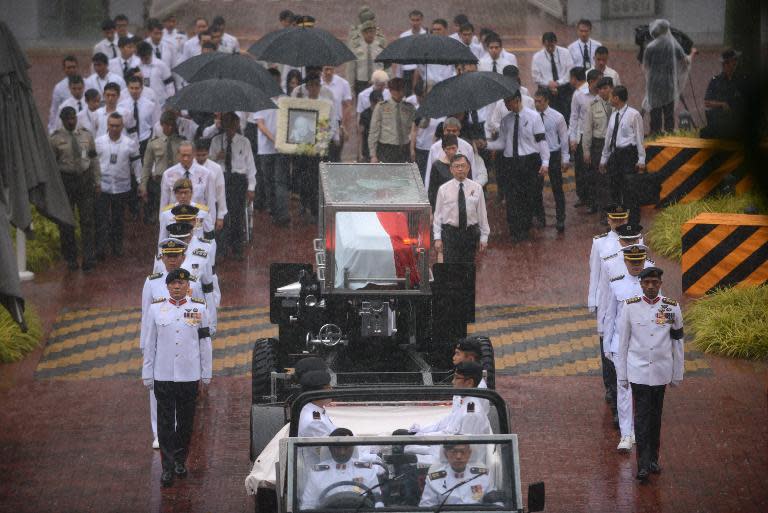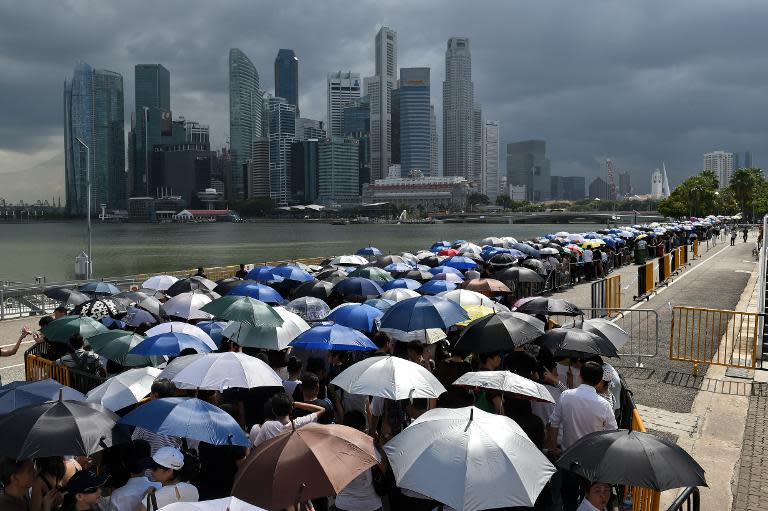COMMENT: The (re)birth of a nation?
COMMENT
I remember Sunday, 29 March, 2015 very well. That’s because I stood in the rain for almost three hours at Commonwealth MRT station, waiting to catch some footage of the late Lee Kuan Yew’s funeral cortege.
As the hours passed and the showers turned into a deluge, the crowd around me, both young and old, steadily built up. Packed against the barricades, dozens of pairs of eyes were glued to smartphones to monitor the progress of the cortege. Some offered the shelter of their umbrellas to strangers.
And though many of us got drenched, and Singaporeans are champion grumblers, I didn’t hear a single word of complaint. Everyone simply wanted to catch one last glimpse of the man.
It was the climax of a week that saw – pardon the cliché – an outpouring of national grief. And it also prompted a friend’s remark that got me thinking: “No need for NDP this year lah, we’ve already had Lee Kuan Yew’s funeral.”
I must confess: I’ve been to the National Day Parade as both spectator and reporter, and have felt a weariness and skepticism towards it. I consider myself a patriotic Singaporean, but NDP has often felt like an overload of choreographed emotion. This year’s parade has extra significance, of course, thanks to SG50 and the passing of our first Prime Minister.
But for all the pretty parades, the fireworks displays, the goodie bags, the constant calls to unity, nothing that is laid on at NDP will ever be able to match the week that we came together to mourn the man who literally shaped Singapore in his image.
This is through no fault of the thousands of dedicated and patriotic participants who work tirelessly each year for the parade. It’s just that they are standing, marching, dancing and performing in the shadow of a giant.

Here’s the hard truth: For all his achievements, Lee Kuan Yew was often a divisive figure. Not everyone agreed with his philosophy or his method of governance, and the legacy of his policies is still being debated. But when he left us, we were at a loss as to how to articulate our loss.
For once in our lives, the flags and stickers and mini-flags being handed out notwithstanding, we were not being told how to feel or behave. Many of us looked past that sometimes instinctive wellspring of resentment, akin to what we might feel towards an authoritarian father, and remembered the lessons he taught and all he had done for us.
We realised just how much he had educated and equipped us. So we mourned, and yes, we even wept, spontaneously. And we looked all around us and were proud to be Singaporeans.
Years from now, we won’t be telling our children and grandchildren about the time we saw that enormous fireworks display, or about the tanks and vehicles rolling past the Padang.
We will tell them about the week that thousands of people turned out to pay their last respects to the man who left, for better or worse, a lasting impact on our lives. When they queued for hours in the hot sun without complaint or incentive, and random acts of kindness that often seem so rare – letting the elderly go ahead in the queue, for example – became an everyday occurrence.

I’m only 35, but I don’t think I will ever see anything like that in Singapore again in my lifetime.
Or maybe I’m wrong. Maybe this year’s NDP, the first one not attended by Mr Lee, will be especially poignant. And maybe it will set a precedent for future generations that have not known his leadership, and teach them about the cost of statehood, and the price of patriotism.
In any case, it feels fitting that even in his absence, Mr Lee’s shadow will loom large. On the morning of National Day, a voice recording of him reading the Proclamation of Independence of Singapore will be broadcast on radio and television.
Then it will be time to watch the parade, whether at home or in person. Who knows how we will feel then?

